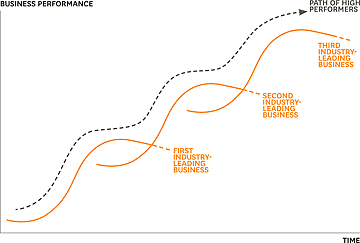One of my favorite insights from The Beak of the Finch relates to business development and the life cycle of a business in evolutionary terms.
In the beginning (a startup), businesses undergo lots of major changes until they find their niche or market where the business is profitable, customers are happy, employees are satisfied, and shareholders/investors are getting their piece of the pie. This corresponds to the adaptive landscape metaphor from Beak of the Finch and evolutionary adaptation of species.
Once a company adapts to their niche, the “innovation” usually slows, and the variations become smaller, until the minor variations usually cancel each other out and the company becomes a “wobbly” species (no major change, just upgrades) unless the adaptive landscape drastically changes again (disruptive technology).
While this isn’t revolutionary in the business context, perhaps framing business in terms of evolutionary biology could lead to non-obvious theories and practices, and I’m keeping this framework in mind for future endeavors.
Do you have any insights on business development or organizational change from reflections on The Beak of the Finch? I’d love to hear them!


I have been fascinated with the evolution or “survival” of businesses for a while. I have been meaning to read The Beak of The Finch for a while now and will be over break. As soon as I finnish up I would love to talk to you more about this. So here as my thoughts based on what I know and have learned so far.
The idea of niche marketing or a companies unique selling proposition is really key for survival. If we think of DSH, there are hundreds of sustainable organizations that people can donate their money towards. Why us? Our USP is that we are retrofitting a home and attempting to provide consumer friendly solutions that can be brought those in an average consumer price bracket.
When you discuss the stagnation that occurs after the innovation stage. I think that a lot of that has to do with the “If its not broken don’t fix it” mentality. However, and I would love your opinion on this, I think this is where most businesses fail. I think there should always be an attempt to look towards innovation/new development even if it is upon old ideas. Without innovation, just like the graph shows, the company will plateau. I do believe that at some point, a company will mature, but with constant innovation within other markets or further development of old projects, the company can draw out the life cycle.
I don’t know about business, but in artificial intelligence literature the innovation vs “not broken, don’t fix it” tension is often known as exploitation vs exploration. From an AI slide deck I’m currently reading:
Exploration vs Exploitation
• Exploration: Explore new environment for higher payoffs
• Continuously exploring new and unknown things can cause current reward to suck
• Exploitation: Stick with what you know to get a known reward
• Can lead to local minima (a la hill climbining)
• Need to balance the two
I love the parallels between business and STEM. Reminds me of the time you and I were talking about Shannon’s communication theory, and while my field focuses on the underlying mathematics of noise and linear transformations, your field uses the same models for understanding context in marketing and customer relations.
You might like this read too: “Engineering your way to marketing success”
http://www.kalzumeus.com/2009/12/31/engineering-your-way-to-marketing-success/
An interesting way to look at businesses as evolving individuals. As for the “wobbly” bit, what of companies that shift drastically to survive? Didn’t Darwin say something about it not being the smartest or strongest but rather those that could best adapt?
Patrick! I’m shocked! I thought you couldn’t think for yourself! =D I know, I know.. be good.
Organization must be treated as a part of ecosystem
•Organizational choices effect the entire system, but at the same time, they must adapt to the system
•Properties of ecosystem: organisms must interact with the elements of environments to survive
When part of system change, other parts must adapt
Individuals who survive are those better adapted to the environment
This concept has already been put into theory and practice in today’s business environment. It’s called the congruence model. It’s being practiced due the 3rd industrial revolution: Network and Systems.
You have pretty good insights/observations on management concepts… maybe, you should look into a PhD in management
p.s. thanks for being good Anna
Considered it. Looking at Learning Sciences. I’ll pick up management stuff as necessary, and I plan to cross-pollinate some of this material throughout.
I googled for 3rd industrial revolution and “Network and Systems” and didn’t find anything conclusive. Mind sending me a few papers/links? 🙂
I was studying for my management final and remembered your note and replied… sorry my lecture didn’t have anything conclusive about the topic either =P
If you find out any more, I’d love to hear about it.